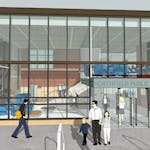Dakota County won't get any federal-disaster aid in the wake of this summer's storms and rampant floods, but it will get money from the state.
Minnesota is newly able to step in when federal funds aren't available, thanks to a law passed during the latest legislative session. Dakota is one of two counties set to receive state aid for damage sustained in storms and floods between June and July — rural Morrison County was the first to benefit from the new law.
The state will work directly with affected cities, reimbursing 75 percent of costs sustained through storm and flood damage between June 11 and July 11.
"We've never really been able to do that in any coordinated manner," said Minnesota emergency management director Kris Eide.
In Dakota County, the state will kick in 75 percent of about $1.3 million, based on a preliminary damage assessment conducted in July.
Gov. Mark Dayton earlier this year signed legislation establishing a state fund that provides aid to local communities after natural disasters.
Following news Tuesday of the denial from the Federal Emergency Management Agency (FEMA), Dayton directed Eide to provide state aid to Dakota County. In a letter, he said she could allocate both funds and other types of assistance as needed.
FEMA's denial came after the state's second request for funds. The federal agency put the county's storm and flood damage at just over $1 million — under the threshold for federal assistance, based on the county's population — after concluding that a landslide in Mendota was not triggered by the heavy rains that pounded the area.
In a mid-September appeal to FEMA, the state argued that the rains did cause the landslide, which will cost the community between $425,100 and $699,400 to repair.
If the Mendota landslide were factored back into the county damage total, the state argued, Dakota would once again be eligible for federal disaster aid. Still, FEMA held firm.
Dakota County often doesn't qualify for federal funds, Eide said, in part because many of its roadways are not eligible for federal highway assistance.
"We are a very high-disaster state, and so it's very frustrating when we're not able to help our communities recover like this," she said. "And now we really can."
Staff writer Jennifer Brooks contributed to this report.
Emma Nelson • 952-746-3287



